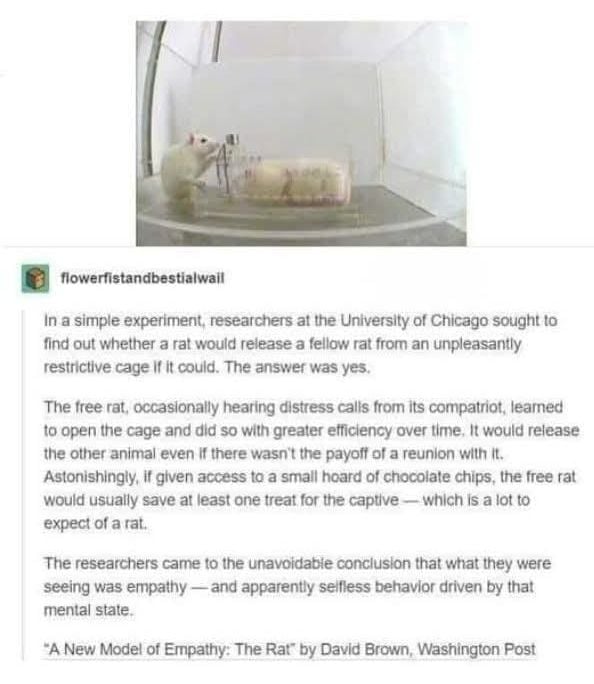I wonder about this in animals all the time. Like, many animals seem to really enjoy being loved on and getting scritches, have a relationship with their owner or caregiver, are happy to see them and snuggle up… but in the wild they might be mostly solitary, only interacting with their own kind for mating and maybe raising young. Yet they’re often very different from the (eat sleep reproduce survive) basic wild animal when given the opportunity. They have personalities, happiness, etc.
Microblog Memes
A place to share screenshots of Microblog posts, whether from Mastodon, tumblr, ~~Twitter~~ X, KBin, Threads or elsewhere.
Created as an evolution of White People Twitter and other tweet-capture subreddits.
Rules:
- Please put at least one word relevant to the post in the post title.
- Be nice.
- No advertising, brand promotion or guerilla marketing.
- Posters are encouraged to link to the toot or tweet etc in the description of posts.
Related communities:
It's called domestication. In the Soviet Union a scientist domesticated foxes by selecting for "niceness". It only took a couple of generations for the typical domestication signs to appear: longer childhood, friendlier face, smartness etc
They’re talking about fully wild animals. Grab a baby squirrel, and it will enjoy human company in no time. Same with raccoons, ravens, mountain lions, etc.
You’d be hard pressed to find an animal that doesn’t take to human companionship when given a real chance. And it has nothing to do with breeding.
Rats, in specific, do what those studying them have described as laugh when being petted/tickled. It's ultrasonic, so we can't hear it, but other rats can hear it when a rat is enjoying themselves.
https://www.science.org/content/article/tickled-rats-reveal-brain-structure-controls-laughter
I'll take the risk of sounding like Willard here, but rats make delightfully playful and affectionate pets.
It sounds counter intuitive but once your rats(need to have at least two) bond to you they treat you like a giant one of them. They'll groom you for hours, and you can play chase with them with your hands like you would with a kitten(without the scratches!) They're like a cat and dog together in a much smaller animal. One of mine played fetch.
I just wish they lived longer and weren't so prone to cancer. Maybe one day science can fix that.
Only 4 or 5 years, right? I don't think I could handle loving a pet who's lifespan was that short. But I do know people who have pet rats and they really love them. Doesn't really surprise me, guinea pigs are similar. And you need to have at least two of them as well.
I think we shouldn't underestimate human empathy. The problem is just that we build structures to avoid it. Rich people choose to not see poor people too much or they would feel empathy and be inclined to help them. If the poor are far away, merely an abstraction that is said to exist, then their existence is not felt strongly enough to trigger an empathy response. Surely there are exceptions to some degree, but I think humans are very empathetic and that's one of our great powers.
Couldn't this be explained by the "tit-for-tat" hypothesis? That selfless behaviour is learned in communal animals, and that its implied it will be you who need help next time?
There is a bat species that I think feeds on blood, and they share the food they managed to get in a night, if a bat refuses to share one night then the next time they get left out of the sharing.
Rats can eat chocolate?
Yeah to a degree, maybe it was some kinda low sugar chocolate or something
Which is why rats never built empires and conquered the world
In many cities, there are more rats than human. And yet, who feeds who?
or destroyed it
Empathy over natural selection ftw.
Empathy was created by natural selection - of groups, not individuals, of course.
Fear and stress shut down empathy. But narcissists feel constant fear and stress. And we've made a hellworld that rewards narcissism
Why do you say the rats are better than us? Humans can be observed doing the same in similar circumstances.
~~Some~~ Most humans. The notable (but not exclusive) exceptions being people who manage to become ultra-wealthy.
On the other hand, they willingly live in sewers and their sense of smell is stronger than ours.
But good or bad is still subjective.
E: maybe a little broad. I meant pleasant smells. In the case of rats probably dictated by biology.
You'd probably willingly live next to a bakery.
